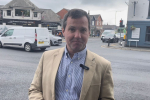
“Action this day!” was the call to the Government and, despite beginning from a standing start, the apparatus of State moved with impressive speed to mobilise our local authorities, health services and the private sector to tackle the emerging SAR CoV-19 pandemic.
We had prepared for the wrong pandemic. Ready for a repeat of the 1918 Spanish flu but not coronaviruses like SARS or MERS which struck in the last twenty years.
Despite this, people across Britain readily accepted the restrictions on normal life and had an abundance of sympathy for the Prime Minister when he was laid low. The Transport Secretary’s trip to Spain as its travel lockdown was imposed symbolised our struggle.
As the country basked in glorious weather that seemed programmed by a higher power to help get us through the lockdown though it was increasingly clear that there was a glitch in the system.
The lockdown dragged out far longer than anticipated and the surge in hospitalisation threatened to follow the dreadful situation seen in the north of Italy. There was genuine fear that our intensive care units would be overwhelmed. In the end, we did not even need the Nightingale hospitals.
All the while, scientists and doctors learnt and shared best practice with friends around the world. Existing safe and effective drugs as well medical techniques are now far better applied than in the early days. Survival rates and recovery are on the rise and will improve further.
Society changed and I would never have believed that the British people would have adapted so quickly to current restrictions but it is all having a cost.
The national debt is at a post war high and it will take many more years to even begin balancing the budget. Our financial system and the Treasury can count the economic costs.
Many have been made unemployed and have no hope of getting a job anytime soon. School leavers hoping to get their first job find that there is nothing and, even those that do, realise that working in a cramped bedroom in a tiny flat is depressing and they have lost many of their learning opportunities.
Students at university are isolated in their halls and feared by local residents because the mass testing has created a spike in positive tests whilst few even feel they had the mildest of autumn colds. Those that needed a part-time job to keep them financially above water have no chance.
Children at school have taken the biggest hit with many receiving the barest level of education for six months, have lost time with their friends and now risk seeing their whole class or entire year group sent home because of one positive test. They also get to pay the national debt.
Many millions of GP and hospital appointments have been cancelled or simply not attended out of fear so we are creating a physical and mental health time bomb. We know it is happening but we have not been told how severe it will be. MPs get regular updates about economic matters but we should have one about the lockdown health impact. The Borough of Bolton has seen 20,000 fewer GP to hospital referrals so far this year. What has been missed and what is the cost?
We have made advances in how we treat and cope with Covid but, with more extreme lockdowns and circuit breakers looming, have the British people been asked if the price is worth it? Have we been asked if the cure is worse than the disease? Have we even been given the information to reach a judgement?
I fear that we are repeating the early mistakes. Greater Manchester has been in a local lockdown for nearly three months and Bolton had three of those weeks in a more extreme local lockdown where many beauty treatments were banned and pubs, cafes and restaurants were closed.
A tier three lockdown is mild compared to what the country faced for three months and Bolton again suffered for three weeks. Both lockdowns failed on their own terms and yet, rather than taking a new approach, we are pressing repeat.
Whilst the debate about the Greater Manchester lockdown rages late into its second week, we have forgotten action this day and replaced it with dither and delay as our “new normal”.


